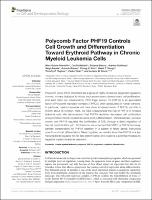| dc.contributor | Vall d'Hebron Barcelona Hospital Campus |
| dc.contributor.author | García-Montolio, Marc |
| dc.contributor.author | Ballaré, Cecilia |
| dc.contributor.author | Blanco, Enrique |
| dc.contributor.author | Gutiérrez, Arantxa |
| dc.contributor.author | Aranda, Sergi |
| dc.contributor.author | Gomez Moruno, Antonio |
| dc.date.accessioned | 2021-12-16T12:38:01Z |
| dc.date.available | 2021-12-16T12:38:01Z |
| dc.date.issued | 2021-04-29 |
| dc.identifier.citation | García-Montolio M, Ballaré C, Blanco E, Gutiérrez A, Aranda S, Gómez A, et al. Polycomb Factor PHF19 Controls Cell Growth and Differentiation Toward Erythroid Pathway in Chronic Myeloid Leukemia Cells. Front Cell Dev Biol. 2021 Apr 29;9:665201. |
| dc.identifier.issn | 2296-634X |
| dc.identifier.uri | https://hdl.handle.net/11351/6701 |
| dc.description | Chronic myeloid leukemia; Erythroid differentiation; Polycomb |
| dc.description.abstract | Polycomb group (PcG) of proteins are a group of highly conserved epigenetic regulators involved in many biological functions, such as embryonic development, cell proliferation, and adult stem cell determination. PHD finger protein 19 (PHF19) is an associated factor of Polycomb repressor complex 2 (PRC2), often upregulated in human cancers. In particular, myeloid leukemia cell lines show increased levels of PHF19, yet little is known about its function. Here, we have characterized the role of PHF19 in myeloid leukemia cells. We demonstrated that PHF19 depletion decreases cell proliferation and promotes chronic myeloid leukemia (CML) differentiation. Mechanistically, we have shown how PHF19 regulates the proliferation of CML through a direct regulation of the cell cycle inhibitor p21. Furthermore, we observed that MTF2, a PHF19 homolog, partially compensates for PHF19 depletion in a subset of target genes, instructing specific erythroid differentiation. Taken together, our results show that PHF19 is a key transcriptional regulator for cell fate determination and could be a potential therapeutic target for myeloid leukemia treatment. |
| dc.language.iso | eng |
| dc.publisher | Frontiers Media |
| dc.relation.ispartofseries | Frontiers in Cell and Developmental Biology;9 |
| dc.rights | Attribution 4.0 International |
| dc.rights.uri | http://creativecommons.org/licenses/by/4.0/ |
| dc.source | Scientia |
| dc.subject | Leucèmia mieloide crònica - Tractament |
| dc.subject | Regulació genètica |
| dc.subject.mesh | Leukemia, Myeloid |
| dc.subject.mesh | /therapy |
| dc.subject.mesh | Gene Expression Regulation, Neoplastic |
| dc.title | Polycomb Factor PHF19 Controls Cell Growth and Differentiation Toward Erythroid Pathway in Chronic Myeloid Leukemia Cells |
| dc.type | info:eu-repo/semantics/article |
| dc.identifier.doi | 10.3389/fcell.2021.655201 |
| dc.subject.decs | leucemia mieloide |
| dc.subject.decs | /terapia |
| dc.subject.decs | regulación de la expresión génica neoplásica |
| dc.relation.publishversion | https://doi.org/10.3389/fcell.2021.655201 |
| dc.type.version | info:eu-repo/semantics/publishedVersion |
| dc.audience | Professionals |
| dc.contributor.organismes | Institut Català de la Salut |
| dc.contributor.authoraffiliation | [García-Montolio M, Ballaré C, Blanco E, Gutiérrez A, Aranda S] Epigenetics Events in Cancer Laboratory, Centre for Genomic Regulation (CRG), Barcelona Institute of Science and Technology, Barcelona, Spain. [Gómez A] Grup de Recerca en Reumatologia, Servei de Reumatologia, Vall d’Hebron Institut de Recerca (VHIR), Barcelona, Spain |
| dc.identifier.pmid | 33996816 |
| dc.identifier.wos | 000649663800001 |
| dc.relation.projectid | info:eu-repo/grantAgreement/ES/PE2013-2016/BFU2016-75008-P |
| dc.relation.projectid | info:eu-repo/grantAgreement/ES/PE2017-2020/PID2019-108322GB-100 |
| dc.relation.projectid | info:eu-repo/grantAgreement/ES/PE2017-2020/PI19%2F01814 |
| dc.rights.accessrights | info:eu-repo/semantics/openAccess |

